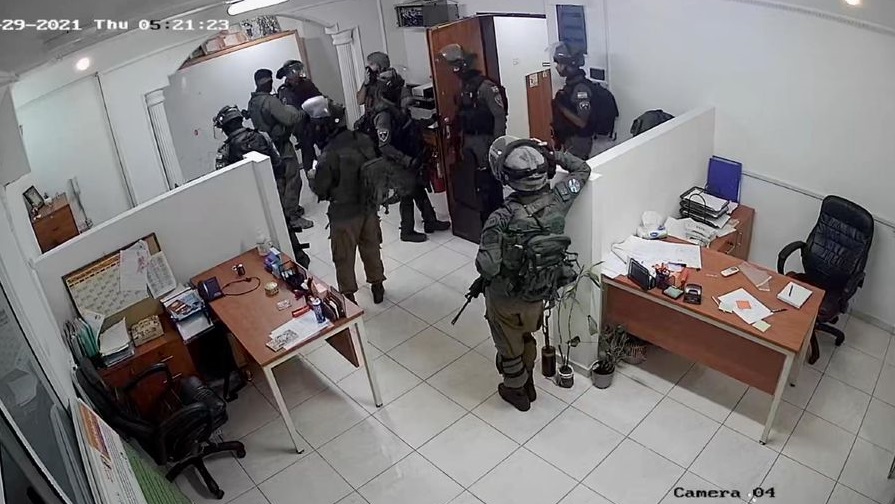Rights organizations across the world have expressed alarm and condemnation after Israel on Friday, October 22, designated six prominent Palestinian human rights and civil society organizations as “terrorist organizations.” They allege that these well-known organizations have links with the leftist Popular Front for the Liberation of Palestine (PFLP) resistance group.
The terrorist designation allows the Israeli government to shut down these groups’ offices, confiscate their assets as well as arrest and imprison their employees. It also bans financially supporting these organizations or publicly proclaiming support for their activities.
The decision was announced by Israeli defense minister Benny Gantz, who in a statement said that the six groups – Al-Haq, Addameer Prisoner Support and Human Rights Association, Defense for Children International Palestine, Bisan Center for Research and Development, the Union of Palestinian Women’s Committees and the Union of Agricultural Work Committees – are a “part of a network of organizations active undercover on the international front on behalf of the Popular Front.” Gantz also declared that the six groups are “controlled by senior leaders” of the PFLP and employ its members, including some who had “participated in terror activity.”
The six organizations carry out crucial social, legal, and human rights work in a number of fields concerning Palestinians. Al-Haq is one of the oldest Palestinian human rights groups active in the occupied territories involved in documenting human rights abuses and violations of international law. Addameer is a legal aid group that provides legal representation and advice to Palestinian prisoners in Israeli custody free of cost. Defense for Children International Palestine focuses on the rights and welfare of Palestinian children living under Israeli occupation. Two of the three others are prominent Palestinian unions advocating the rights and interests of the women in Palestine, and of Palestinian agricultural workers and farmers, while the Bisan center is a civil society organization working towards democracy, equality and human rights. Al-Haq, told reporters that this was a “political decision” that had nothing to do with security but was aimed at “stopping the work of these organizations.”
The PFLP, which has both a political and an armed wing, has for long been banned as a terrorist group for its resistance activities against the Israeli occupation. Countries such as the United States, Canada and European Union have also designated it as a terrorist group. It is one of the oldest Palestinian political and resistance groups and has been historically involved in fighting against Israeli occupation and violence. It has been the target of fierce persecution and repression, with many of its well known leaders having been illegally detained, imprisoned or assassinated by the Israeli regime. The most recent case was that of Khalida Jarrar, the PFLP parliamentarian and feminist, who has been jailed multiple times in the past several decades, including under the illegal policy of administrative detention, by which Israel can detain Palestinians indefinitely without or trial.
The defense ministry statement went on to say that the groups serve as a “central source” of financing for the PFLP and accused them of receiving “large sums of money from European countries and international organizations.” Israel, however, did not provide any evidence to substantiate these allegations.
News of the outlawing of the six groups has been sharply denounced by a number of Palestinian, Israeli, and international human rights groups. Amnesty International and Human Rights Watch, in a joint statement, described the decision as “appalling and unjust”, and “an attack by the Israeli government on the international human rights movement”. They added that this decision “is an alarming escalation that threatens to shut down the work of Palestine’s most prominent civil society organizations,” and “the decades-long failure of the international community to challenge grave Israeli human rights abuses and impose meaningful consequences for them has emboldened Israeli authorities to act in this brazen manner.”
Israel-based human rights organization B’Tselem termed the decision as a “move that characterizes totalitarian regimes,” and that it “stands in solidarity with our Palestinian colleagues, proud of our joint work with them over the years – and will continue to do so.”
The United Nations Human Rights Office expressed “alarm” about the decision and in a statement said that “counter-terrorism legislation must not be used to constrain legitimate human rights and humanitarian work. These designations are the latest development in a long, stigmatizing campaign against these and other organizations, damaging their ability to deliver on their crucial work.”
Several other Palestinian rights groups have been similarly banned in the recent past, such as the Samidoun prisoner solidarity network, designated a “terrorist group” in February this year, and EuroPal Forum, the International Legal Coalition for Palestine and the Popular Conference of Palestinians Abroad, which were banned in August.





